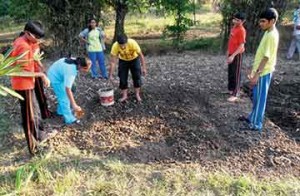Prachi Ranadive
 The most frustrating thing for me as a geography teacher is having to teach geography inside a classroom! Although I am aware that it is impractical for us to ensure that students learn about nature in nature all the time, it is definitely worth it to make an attempt wherever possible.
The most frustrating thing for me as a geography teacher is having to teach geography inside a classroom! Although I am aware that it is impractical for us to ensure that students learn about nature in nature all the time, it is definitely worth it to make an attempt wherever possible.
I wish to share a success story with you. Soil, irrigation, and agriculture are three major topics in class 10. Most students do not study agriculture (as per the ICSE board, students can attempt any 5 questions out of 9 for their exams. Each topic is one question. This gives them scope to not learn some topics) as they find it difficult to remember or analyze related factual data. I strongly believe that these three topics are not in the curriculum just for scoring marks. Students need to learn them to understand ecology and society. Knowledge of these subjects is a window to reality.
In my attempt to conceive new teaching strategies for my class, I spoke with Ms. Michelle Chawla, founder member of Tamarind Tree, a charitable trust based in Dahanu, Maharashtra. At Tamarind Tree they practice non chemical farming, and our students of class 4 visit them three times a year to experience sowing, transplanting, and harvesting of paddy. Realizing this would be useful for the older children too, we organized to take students of class 9 to their farm, once in December and then in June. The first step was identifying the outcomes from the EVS and geography curriculum related to soil, irrigation, and agriculture. Michelle worked on the outcomes which will bring to the notice of students the contemporary and traditional issues of the Warli community which practices agriculture in Dahanu.
The curriculum chalked out for the visit was based on sustainable agriculture, which teaches children their moral obligation to be caretakers and stewards of the finite resources of our planet. This visit was also meant to sensitize the children to the challenges faced by rural communities and give them first-hand experiences to enhance their understanding of the concepts related to soil, irrigation, natural vegetation, and fertilizers. We also looked at other subjects and tried to make this an integrated learning module.
The author teaches classes 9 and 10 in Shishuvan, Mumbai. She is the Head of the Social Studies department. She can be reached at prachirandr@gmail.com.
